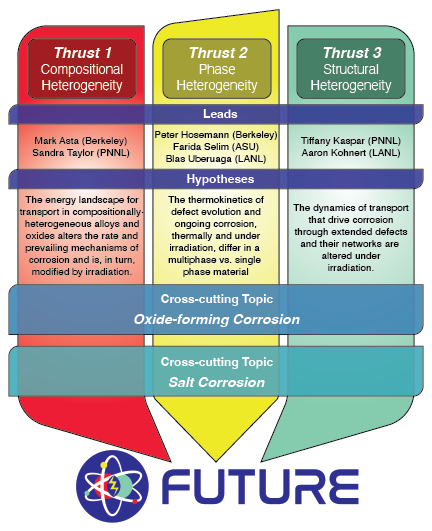Los Alamos National LaboratoryFUTURE: Fundamental Understanding of Transport Under Reactor Extremes
An Energy Frontier Research Center funded by the Department of Energy, Office of Basic Energy Sciences
Research
FUTURE is organized into three Thrusts that target the fundamental behavior of materials under the coupled extremes of irradiation and corrosion.
CONTACT US
- Director
- Blas Uberuaga
- LANL
- (505) 667-9105
- Director
- Peter Hosemann
- UC Berkeley
- (510) 717-5752
The goal of FUTURE is to reveal the fundamental mechanisms that drive materials evolution under the coupled extremes of irradiation and corrosion.
FUTURE 2.0's Thrusts
- Thrust 1: Compositional Heterogeneity
- Thrust 2: Phase Heterogeneity
- Thrust 3: Structural Heterogeneity

Research Plan
We combine experiment and modeling to understand the fundamental processes responsible for materials evolution under concurrent irradiation and corrosion. Our focus is on materials heterogeneities - those aspects of materials that deviate from non-ideality and dictate the properties of the material.
Each of the thrusts in FUTURE is motivated by a specific scientific hypothesis that gets at the heart of the problem we are addressing:
- The energy landscape for transport in compositionally-heterogeneous alloys and oxides alters the rate and prevailing mechanisms of corrosion and is, in turn, modified by irradiation.
- The thermokinetics of defect evolution and thus ongoing corrosion, thermally and under irradiation, differ in a multiphase vs. single phase material.
- The dynamics of transport that drive corrosion through extended defects and their networks are altered under irradiation.
Tying the Thrusts together are Cross-Cutting science Topics related to different corrosion environments: oxide-forming corrosion and molten salt corrosion.
Together, these Thrusts interrogate the fundamental mechanisms responsible for materials evolution that drive the response under coupled reactor extremes.




